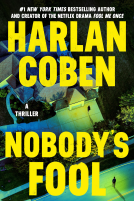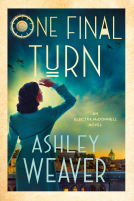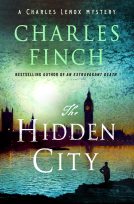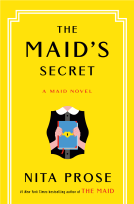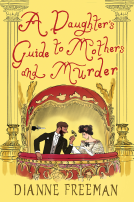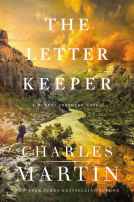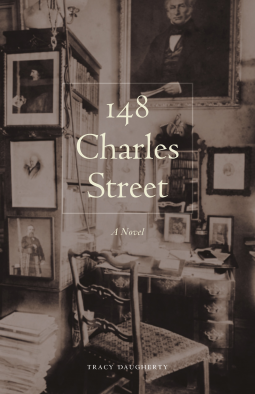
148 Charles Street
A Novel
by Tracy Daugherty
This title was previously available on NetGalley and is now archived.
Send NetGalley books directly to your Kindle or Kindle app
1
To read on a Kindle or Kindle app, please add kindle@netgalley.com as an approved email address to receive files in your Amazon account. Click here for step-by-step instructions.
2
Also find your Kindle email address within your Amazon account, and enter it here.
Pub Date Apr 01 2022 | Archive Date Mar 31 2022
University of Nebraska Press | Bison Books
Talking about this book? Use #148CharlesStreet #NetGalley. More hashtag tips!
Description
Tracy Daugherty’s historical novel 148 Charles Street explores the fascinating story of Willa Cather’s friendship with Elizabeth Shepley Sergeant. The women shared a passion for writing, for New York, and for the desert Southwest, but their sensibilities could not have been more different: Cather, the novelist of lyrical landscapes and aesthetic refinement, and Sergeant, the muckraking journalist and literary activist. Their friendship is sorely tested when Cather fictionalizes a war that Sergeant covered as a reporter, calling into question, for both women, the uses of art and journalism, the power of imagination and witness. 148 Charles Street is a testament to the bonds that endure despite disagreements and misunderstandings, and in the relentlessness of a vanishing past.
148 Charles Street explores, as only fiction can, the two writers’ interior lives, and contrasts Sergeant’s literary activism with Cather’s more purely aesthetic approach to writing.
Advance Praise
“I can think of few novelists who have written so unerringly about literary ambition, especially in women. In this quietly passionate book, Tracy Daugherty follows Willa Cather and her friend, journalist and social reformer Elsie Shepley Sergeant, through their long, ardent battle over the purpose of art, a conflict waged from the most refined salon in Boston all the way to a ruined adobe hut in New Mexico. What superb company they are, because of their differences, and what gorgeously detailed worlds they inhabit. This is a novel with so much heart, written with such deep intelligence, that I felt wiser and more humane myself by the end of it.”—Suzanne Berne, author of A Crime in the Neighborhood and The Dogs of Littlefield
Available Editions
| EDITION | Other Format |
| ISBN | 9781496229748 |
| PRICE | $19.95 (USD) |
| PAGES | 146 |
Featured Reviews
 Jill T, Reviewer
Jill T, Reviewer
This is a wonderful book that many people will enjoy. Well written and deep emotional characters. 3 stars
Thanks for the ARC.
 E W P, Reviewer
E W P, Reviewer
This book is exquisite. A short, jam-packed intellectual tour that starts and ends at the intersection of 148 Charles Street and the lives and work of Willa Cather and Elizabeth Shepley Sergeant. Reading it is, in a way, more like watching a play—it all comes alive to that degree.
148 Charles in Boston is the literally and figuratively storied address of writers Annie Fields (widow of publisher James T. Fields) and later, Sarah Orne Jewett. For years, Fields’s home was the setting of eminent salons that drew figures like Dickens, James, Hawthorne, Emerson, and Harriet Beecher Stowe. It was a place that inspired Cather and to which she aspired. Her protégé, Elsie Sargent, was more interested in journalistic activism than intellectual artistry, exhibiting what Cather viewed as a “reckless weakness of social reform” (a condition apparently common, in the view of many, to Bryn Mawr alumnae). Their respective responses to 148 Charles—Cather’s adoration and Sergeant’s contempt for the “dowagers’ literary mausoleum”—captures the pair’s peculiar relationship, which spans Boston, Manhattan, the American Southwest, war-ravaged Europe, and a rapidly receding past replaced by a suspect present in which landmarks steadily simply disappear, as with the temple at 148 Charles that becomes a mere parking garage. The book is clever, beautifully written, and compelling. As with 148 Charles itself, the end comes too soon.
 Mary Ann D, Reviewer
Mary Ann D, Reviewer
This is such a well-written book. The writing made the visuals come alive for me. The differences in the subject's writing styles was brought to light. A most enjoyable read.
 EMILY L, Reviewer
EMILY L, Reviewer
148 Charles Street is a truly interesting piece of historical fiction that covers periods in the lives of Willa Cather and Elizabeth "Elsie" Sergeant. It is less a day to day description of their long friendship and more a study of how they influenced one another, despite their significantly different world views and life choices. While an editor at McClure's Magazine, Willa met Elsie, when she submitted her first piece to be published, "Toilers of the Tenement." The story opens in 1908, as Elsie and Willa are walking to 148 Charles Street in Boston, home to a widow, Annie Fields and the the writer, Sarah Orne Jewett. Over much of the mid to late 1800s, the Fields entertained the most renowned writers of their time, Charles Dickens, Nathanial Hawthorne, Henry James, Walt Whitman, Henry Wadsworth Longfellow… But in 1908, they are already historic.
While Charles Street has always had some storefronts, it is increasingly becoming more commercial, as a dormitory for nurses is being erected and houses are being torn down for more commercial structures. If Fields and Jewett are the past, Cather is still drawn to their era and Elsie represents the new idealistic muckraker, progressive, politically aware, concerned less for art for arts sake and more for the human condition and how her writing can impact it. Cather is in love with beauty and words and what she can create-- often touching on the human condition, but not to make a point so much as to tell a story. In their passing conversation, Willa mentions the beauty of New Mexico and her love for it and suggests that Elsie should go there.
And then it is 1922 and we are in New Mexico where Elsie is renovating an old Mexican adobe hut, becomes involved in Native American issues, re-injures a foot she seriously injured in France when she reported on WWI from the frontlines, and corresponds along the way with Willa. Daugherty nicely creates a feeling of the community Elsie formed there and the work she did. She brings in Elsie's friendship with Carl Jung who is drawn to visit because of some things she has shared with him about a particular Native American Chief's telling her of his dreams/visions/world view. Elsie is in New Mexico, when she receives a copy of Willa's new book, "One of Ours", a story of an ordinary man who dies in France during the war, based on Willa's cousin. Elsie is distraught and perhaps feels betrayed over Willa's romanticizing the war. Although the novel won a Pulitzer, it was subject to quite a bit of criticism for appearing to glorify war. Again, the women's different world views and temperaments are exposed, yet they remain in touch.
Next, the story focuses on a period in Willa's life in 1940. She and her long time "roommate" Edith Lewis have lived for several years in a rather dark apartment and it fits her current mood. She has an excruciatingly painful condition in her writing wrist and the chapter opens with Elsie sending her a cane, having heard Willa injured her leg. Right off, Willa is annoyed at Elsie's getting things wrong and her, too long for Willa, narrative about the New Mexico priest who gave Elsie the cane. They have been out of touch since Elsie suggested that Willa no longer exuded her enthusiasm for life and that conversations with her had become hard. Almost immediately, Edith leaves for five weeks in Europe and we are taken through a period of Cather's life where she is even more restless, cantankerous and judgmental than usual and yet we are drawn to her and want her to be a less miserable person.
Among the people Willa judges is Elsie, who now lives in a small cottage up the Hudson river because her finances do not stretch to living in the city. She essentially assumes the worst of Elsie when she writes, that she knowingly writes things just to irritate Willa or to complain of her impecunious circumstances and she simply does not understand why Elsie will not write novels as she does. And then, after an encounter, where she is reminded of a character in one of her own novels, Willa has an epiphany about Elsie and their relationship that brings resolution.
In the end, it is again 1908 and we return to Willa and Elsie at 148 Charles Street, and as they leave the house, realizing they have looked back on a piece of history, continuing a discussion that highlights their differences. I love the summing up of their friendship, already, when they embrace, "without the slightest understanding of each other."
Daugherty's writing is entertaining and the choice she made about how to structure this novel into three discrete and far apart times in their lives worked well to illustrate this friendship. I got so engaged, I found myself researching the two characters before I'd finished the book. That, for me is a sign of a great piece of historical fiction, this need to know more. While Daugherty admits to taking license with the facts and timeframes, it is fair to say she achieved her intention of capturing the spirit of these two women of their time.
This book was such a beautiful, nuanced exploration of the friendship between Willa Cather and Elizabeth Shepley Sergeant. Prior to reading this story, I wasn't immediately aware of the deep connection between Cather and Sergeant, or the impact it had on both women and their lives and work. As a writer, I'm always looking for new ways to learn about the women who have mastered the craft before me, and 148 Charles Street was the perfect way to expand my horizons even further.
Daugherty's writing is engaging throughout the entire book. I really enjoyed how these women effectively came to life on the page through Daugherty's talented narration. It's the type of book that's so enchanting, and such a quick read, that you would find yourself picking it up and revisiting it over and over again across the years. A super piece of writing.


